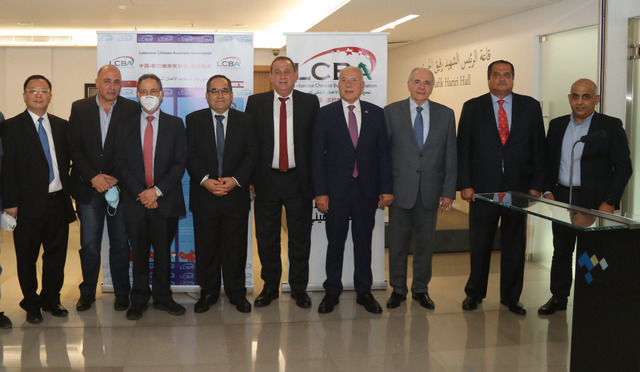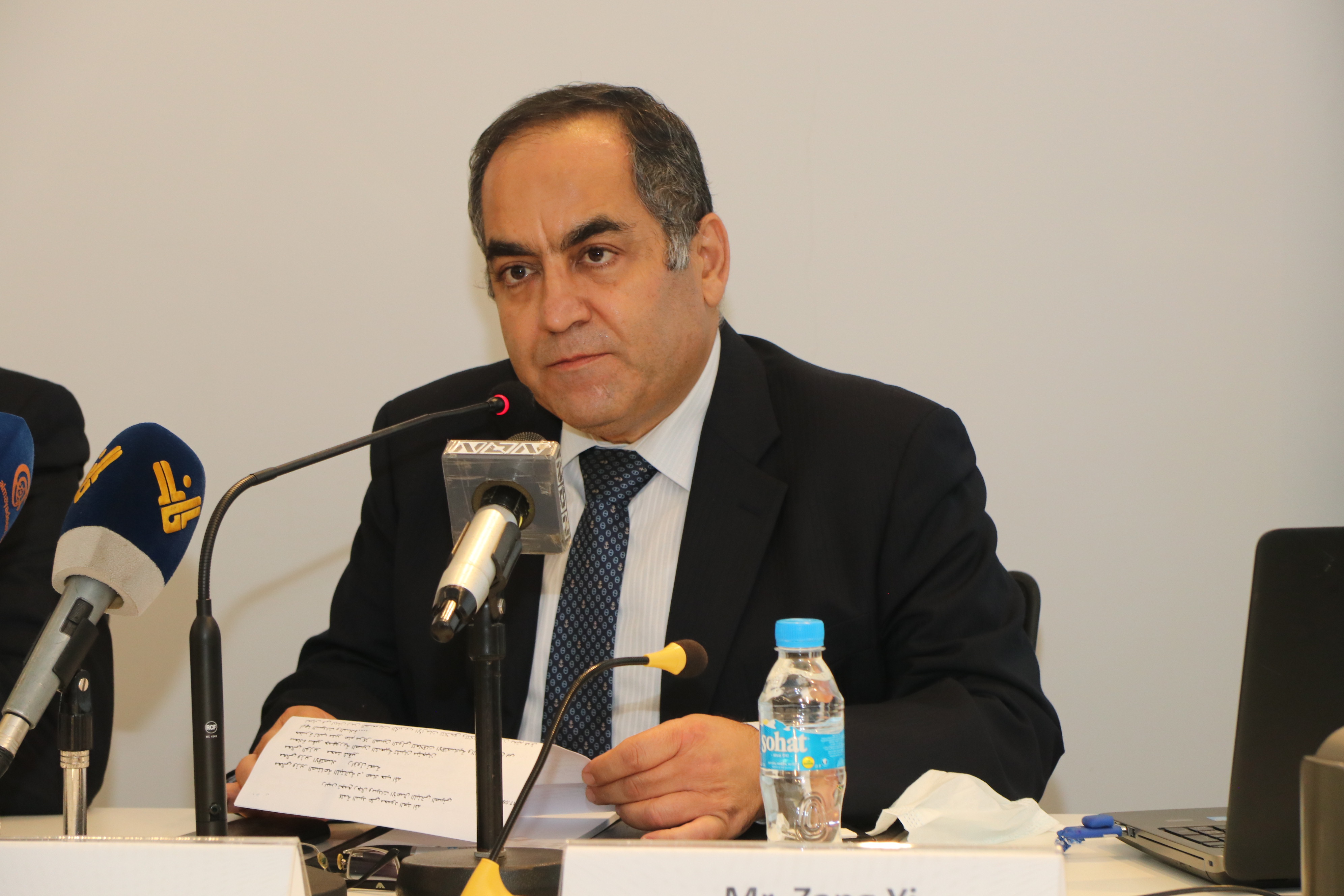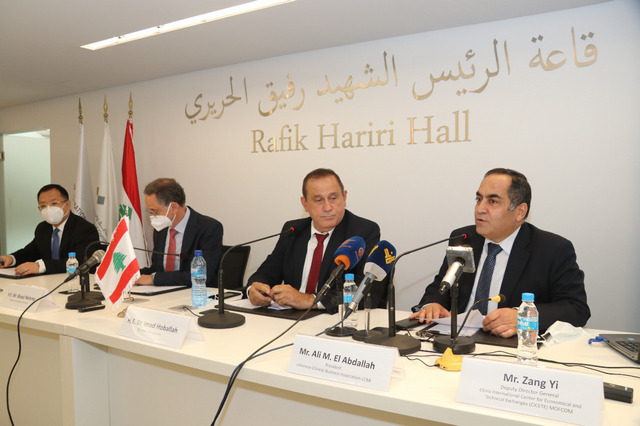Minister Naameh: Funds Will Flow to Lebanon Once International Confidence Is Restored; We Will Exit the Crisis in Three Steps, Starting with Forming a Government
Minister Hoballah: Lebanon Will Not Exit Its Crisis with a “Clientelist” or Factional Government but with a Government That Implements Reforms
Ambassador Minjian: Lebanon Has a Developed Services Sector, Regional Advantages, and Distinctive Features
Ali Mahmoud El Abdallah: Lebanon Will Emerge from Its Crisis, and the Private Sector Will Have the Opportunity to Contribute to Reconstruction

Beirut, August 17, 2021
During a press conference at the Chamber of Commerce, Economy Minister Raoul Naameh said that Lebanon will achieve unprecedented economic growth globally and will emerge from the crisis once a government is formed that signs an agreement with the International Monetary Fund (IMF), begins implementing reforms, and restores the confidence of both Lebanese and foreign investors.
Industry Minister Dr. Imad Hoballah added that Lebanon cannot overcome its crisis with a “clientelist” or factional government, but only with a government committed to reforms.
The statements by Ministers Naameh and Hoballah were made during a press conference organized by the Lebanese-Chinese Business Association, represented by its President Ali Mahmoud El Abdallah, to announce support for Lebanese companies’ participation in the China International Fair for Trade in Services (September 2–7, 2021) through free participation.
The event was attended by Chinese Ambassador Qian Minjian, Deputy Director-General of the China International Center for Economic and Technical Exchanges Zhang Yi, and other organizers of the China International Fair for Trade in Services.
At the start of his speech, Ali Mahmoud El Abdallah said that Lebanon will emerge from its crisis through the efforts of dedicated and loyal individuals, and that the private sector will have the opportunity to contribute to the country’s reconstruction.
The press conference was also attended by the Economic and Trade Counselor at the Chinese Embassy, Ms. Li Jing; the President of the Chamber of Commerce, Industry and Agriculture in Tripoli and Northern Lebanon, Tawfiq Deboussi; the Lebanese Industrialists’ Association, represented by Vice President George Nasrawi; the President of the Lebanese Food Industries Syndicate, Ahmad Hatit; the President of the Lebanese-Gulf Economic Relations Development Authority, Elie Rizk; the Head of the Trade Department at the Ministry of Economy, Simon Jabbour; the Shouf and neighboring industrial associations, represented by Vice President Youssef Sultan; and other economic figures.

Minister Hoballah: Reform-Driven Government Needed

At the beginning of his speech, Minister Hoballah expressed his condolences to the people of Akkar, especially the families of the martyrs, and prayed for the speedy recovery of the injured. He urged the security and judicial authorities to quickly identify the responsible parties, hold them accountable, and take the necessary measures.
Regarding the economic and social crisis and recent developments, he said:
“Lebanon will only emerge from the crisis through honorable Lebanese citizens. It will not emerge with a ‘clientelist’ or factional government. Exiting the crisis requires a government formed by a team committed to serving all Lebanese.”

He noted that the government announced an economic rescue plan in April of last year, aiming to put Lebanon on the right track and convince the international community of Lebanon’s intent and determination to implement fast, effective, and transparent reforms to secure support for saving the country. He stressed that a government implementing reforms, especially economic reforms aimed at making Lebanon’s economy productive, is essential to support the industrial sector.

Minister Hoballah added that the crisis originated from monetary and fiscal policies and widespread corruption across public and private institutions, which led to financial and economic collapse. The crisis was further compounded by the COVID-19 pandemic and the Beirut Port explosion, causing additional death and destruction.

He also highlighted progress in producing the COVID-19 vaccine in Lebanon in cooperation with Russian partners, asserting that local industry is capable of meeting Lebanon’s needs. He praised Lebanese manufacturing as matching or even surpassing foreign products and noted that local vaccine production could alleviate public suffering, reduce pressure on the healthcare system, and give the economy an opportunity to resume production, sales, exports, and bring in foreign currency.

Minister Hoballah also mentioned cooperation with China to transform opportunities into tangible results, particularly in electricity production, railways, water treatment, oil, waste management, and industrial projects. He thanked China, Ambassador Minjian, Ali Mahmoud El Abdallah, and the China International Center for Economic and Technical Exchanges for their continuous support and friendship. He encouraged Chinese investors and companies to establish factories in Lebanon and invest across various sectors.

Minister Naameh: Three Steps to Restore Confidence

Minister Naameh stated:
“We all know the details of the crisis and its difficulties, but we also know the required solution, which begins with forming a new government, then signing an agreement with the IMF, and finally implementing reforms. These steps will restore confidence among Lebanese and foreign investors. Once Lebanon regains international trust, unprecedented growth will be possible. Funds will flow not only from the IMF but also from countries that want to support Lebanon and Lebanese investors awaiting the right conditions to return and invest.”
He emphasized opportunities for strengthening Lebanon’s industrial sectors and boosting exports to China, noting the disparity in 2019 between imports from China ($1.6 billion) and exports ($12 million), which slightly improved in 2020 (imports $750 million, exports $16 million). He highlighted Lebanon’s global reputation in food products and urged Lebanese companies to use the exhibition to showcase products and increase exports to China.
Naameh further noted that with a government agreement with the IMF and the implementation of reforms, international and Chinese companies could invest in Lebanon, particularly in privatization projects, leveraging Chinese companies’ international experience and financing capabilities. He also suggested providing Lebanese students with the opportunity to learn Chinese.
He concluded by explaining efforts to develop an English- and Chinese-language export website to assist Lebanese businesses in reaching European and Chinese markets.
Ambassador Qian Minjian: Lebanon’s Developed Services Sector

Ambassador Qian said:
“I am honored to participate in this press conference at the invitation of the Lebanese-Chinese Business Association. I thank Ministers Raoul Naameh and Imad Hoballah, and Ali Mahmoud El Abdallah for their efforts. The China International Fair for Trade in Services (CIFTIS), alongside the China International Import Expo (CIIE) and the Canton Fair, serves as a high-level platform to expand China’s openness. President Xi Jinping sent a congratulatory message in 2019 and spoke at the Global Services Trade Summit in 2020, expressing China’s intent to enhance cooperation with countries worldwide and expand services imports.”
He noted that the fair covers IT, finance, insurance, cultural tourism, education, sports, healthcare, logistics, construction, and other service sectors. Lebanon has a developed services sector, regional advantages, and distinctive characteristics, forming a solid foundation for cooperation with China. For example, Lebanese students won a Middle East championship in a Huawei competition, and Lebanon, as the region’s leading ski destination, is invited to participate in the upcoming Beijing Winter Olympics and showcase its sports services at CIFTIS.
Ali Mahmoud El Abdallah: Lebanon Will Overcome the Crisis

El Abdallah stated:
“The Lebanese private sector has historically helped the country overcome crises. Although this crisis is unprecedented, we remain hopeful and experienced in creating solutions. The Lebanese-Chinese Business Association, together with the Chinese Embassy, Ministers Naameh and Hoballah, trade unions, industrial associations, and Chinese institutions, works tirelessly to support Lebanese companies and communities. Today’s initiative provides free participation for Lebanese companies in CIFTIS (September 2–7, 2021), including online participation to showcase products, services, and solutions.”
He added:
“Despite Lebanon’s ongoing difficulties and social-economic collapse, we are determined to stand firm, support our people, and rebuild together. Our choice is life and solidarity, with moral integrity and high morale.”
El Abdallah highlighted the broad participation of Chinese and international partners at the fair, supported by institutions such as the WTO, OECD, UNCTAD, the WIPO, and the International Trade Center. He encouraged all Lebanese companies to participate and take advantage of the free virtual exhibition and associated conference activities.


Zhang Yi: Welcoming Lebanese Companies
Zhang Yi said:
“I am honored to participate in this press conference and provide information about CIFTIS. Since its launch in 2012, the fair has achieved significant results: 640,000 square meters of bookings, 1,102 conferences, over 1.4 million visitors, and more than 10,000 exhibitors from 188 countries, with participation from senior Chinese officials including President Xi Jinping. This year, the fair will occupy 130,000 square meters, host 200 conferences and meetings, and include six types of activities, such as international trade in services, conferences, exhibitions, promotional meetings, achievement announcements, and side events. Notably, participants and visitors can also join remotely through a digital platform. We welcome Lebanese institutions and companies to engage with exhibitors, visitors, and all activities hosted by the fair.”



